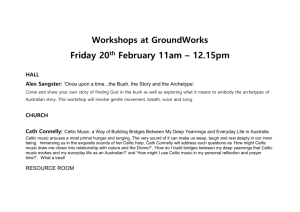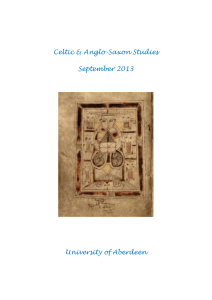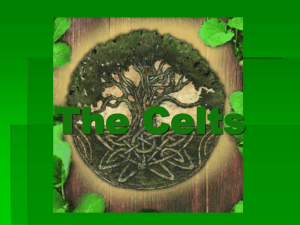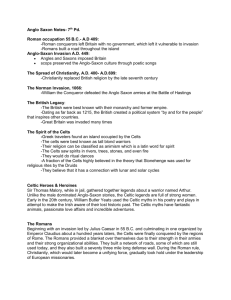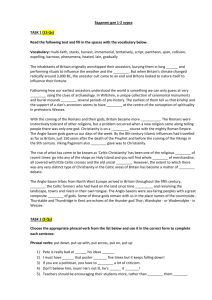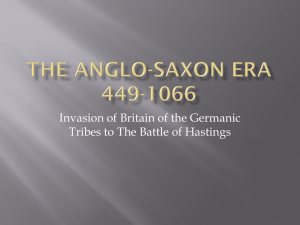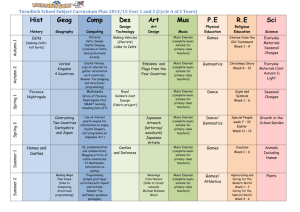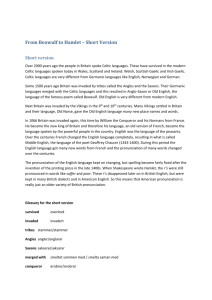MLitt_Celtic__Anglo-Saxon_Studies_2015
advertisement
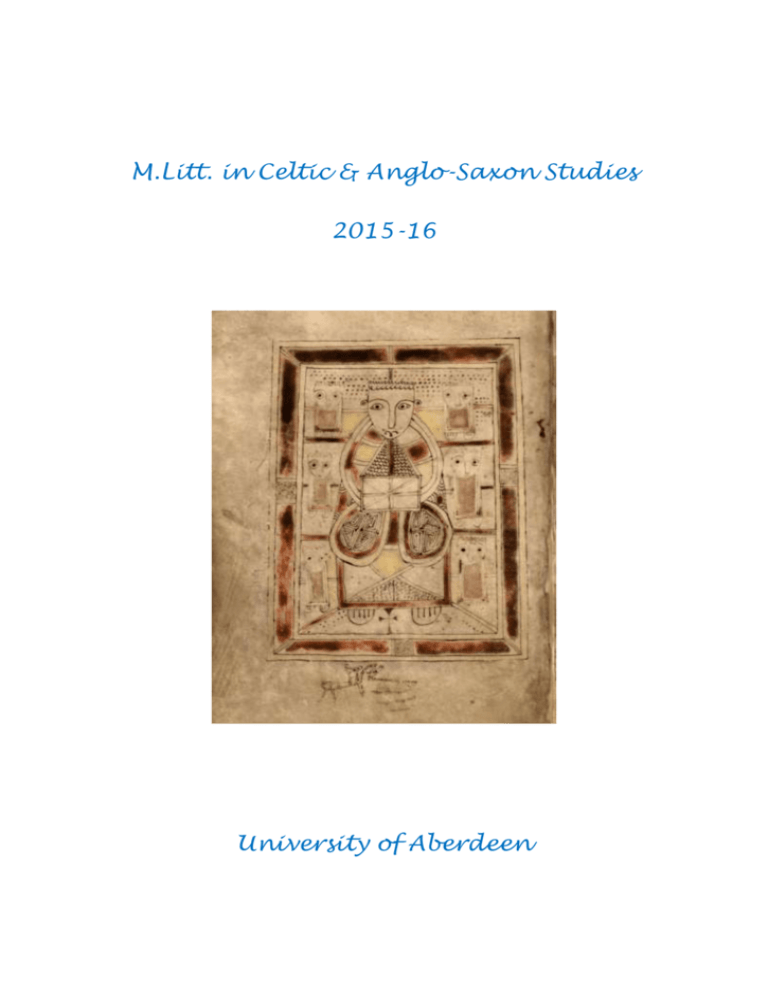
M.Litt. in Celtic & Anglo-Saxon Studies 2015-16 University of Aberdeen 2 INTRODUCTION The M.Litt. in Celtic & Anglo-Saxon Studies is a new interdisciplinary postgraduate programme, which commenced in September 2014, based in the School of Language and Literature. It offers comparative study of the Celtic and Germanic worlds through a combination of (1) taught literature/history courses with independent research components under the supervision of academic staff, and (2) training in mediaeval and modern languages. Prior knowledge in these disciplines is not required, but previous study in related subjects is of some advantage. This innovative programme, which is unique in Scotland, encourages students to think across traditional scholarly boundaries of ‘Celtic studies’ and ‘Anglo-Saxon studies’ and to explore the mediaeval interactions between these cultures, and between the Insular world and Scandinavia. In 2015-16, courses will include Mediaeval Welsh language, modern Scottish Gaelic, ‘Tales of Vengeance and Enchantment: The Heroic Age in Irish and Icelandic Saga Literature’, and ‘Celtic & Anglo-Saxon Kingship and the Exercise of Authority in the Earlier Middle Ages’. As the culmination to their study (1 year full-time or 2 years part-time), students will write a dissertation in a Celtic and/or Germanic subject of their choice. They may wish to build on material studied in our taught courses, but are also very welcome to explore a new area of interest, in consultation with the academic staff. 3 PROGRAMME STRUCTURE 1. One 15-credit ‘core’ course in each half-session (total 30 credits): CE5010 Celtic & Anglo-Saxon Research Seminar (first half-session) CE5516 Dissertation Preparation (second half-session) 2. One 30-credit course in each half-session (total 60 credits) 3. One additional 30-credit course in first OR second half-session (30 credits) 4. CE5902 Dissertation in Celtic & Anglo-Saxon Studies (60 credits) Total: 180 credits COURSE OPTIONS FOR 2015-16 First half-session: CE5010 Celtic & Anglo-Saxon Research Seminar (15 credits -- ‘core’ course) Dr Aideen O’Leary, Professor Patrick Crotty, Professor David Dumville, and Professor Ralph O’Connor A series of five seminars on Celtic and/or Anglo-Saxon topics, each focusing on a particular work by a member of staff in Celtic & Anglo-Saxon Studies or related disciplines. In each seminar the author will explain the way in which the work was developed, the theoretical and methodological techniques applied, the kinds of sources used, and its relationship to the broader fields of research. The students will then discuss the piece as a group, having read the essay or chapter in advance. The seminars will therefore provide essential insights into scholarly methods and research debates. Five two-hour seminars, to be held fortnightly Assessments: One essay of approx. 3,500 words (90%) and a seminar presentation (10%) 4 CE5014 Reading Celtic 1 (30 credits) Dr Aideen O’Leary Students will acquire an understanding of Mediaeval Welsh grammar and vocabulary, and will read excerpts from the Mabinogion in Welsh. Three one-hour classes per week Assessments: A two-hour examination (60%), two language exercises (10% each), and two in-class tests (10% each) CE5016 Modern Gaelic for Postgraduates A (30 credits) Dr Moray Watson This is an intensive language course in (Scottish) Gaelic, for students who have little or no previous knowledge of Gaelic. It concentrates on the acquisition of basic grammar and vocabulary, and on the development of reading, writing, speaking and listening skills. Four one-hour classes per week Assessments: A two-hour examination (40%), an essay of approx. 2,000-2,500 words on aspect(s) of the Gaelic language, e.g. phonology, morphology, syntax or comparative philology (20%), four language exercises (5% each), and oral assessment (20%) CE5030 Tales of Vengeance: The Heroic Age in Irish and Icelandic Saga Literature (30 credits) Professor Ralph O’Connor Mediaeval Irish and Icelandic sagas represent the largest and most varied, and certainly the most entertaining, body of vernacular prose narrative in existence in early mediaeval Europe. They contain some of the North’s most distinctive and impressive contributions to world literature. Drawing on common oral and literary traditions from the North Atlantic cultural zone, these tales dramatize the legendary past by populating it with larger-than-life heroes whose deeds and misdeeds were felt to define the meaning of that past for mediaeval audiences. These two bodies of northern literature are usually studied in isolation, but this course will place them side by side. It will explore narratives ranging from heroic tales of cattle-raids and bloodfeuds to stories about the living dead and quests to the otherworlds of 5 the Western and Arctic oceans. The tales will be analysed (in translation) from literary and historical perspectives. One one-hour lecture and one two-hour seminar per week, and independent study on Celtic and Icelandic material Assessments: A final paper of approx. 4,000 words, including references but excluding bibliography (90%), presentation (10%), and a formative essay of approx. 1,000 words Second half-session: CE5526 Dissertation Preparation (15 credits -- ‘core’ course) Dr Aideen O’Leary The course consists of one-to-one supervision with the member of staff best equipped to advise the student on her/his dissertation topic. It will involve detailed and critical discussion of primary and secondary materials suited to the research interests of the student (as developed over the preceding semester) with the aim of providing the student with the fullest preparation for researching and writing the dissertation in the summer. Six one-hour supervisions (one approximately each fortnight) Assessments: An essay of approximately 1,500 words (10%); annotated bibliography (90%) CE5525 Reading Celtic 2 (30 credits) Dr Aideen O’Leary This course will deepen students’ knowledge Mediaeval Welsh grammar and vocabulary. They will learn about the changes in the language during the Middle Ages, and will start to read and analyse Welsh poetry. Three one-hour language-classes per week Assessments: A two-hour examination (60%), two language exercises (10% each), and two in-class tests (10% each) 6 CE5529 Modern Gaelic for Postgraduates B (30 credits) Dr Moray Watson This course builds on the foundation laid in Modern Gaelic for Postgraduates A, and concentrates on the acquisition of further basic grammar and vocabulary, and on the development of more advanced reading, writing, speaking, and listening skills. Four one-hour classes per week Assessments: A two-hour examination (40%), an essay of approx. 2,000-2,500 words on aspect(s) of the Gaelic language, e.g. phonology, morphology, syntax or comparative philology (20%), four language exercises (5% each), and oral assessment (20%) CE5532 Celtic and Anglo-Saxon Kingship and the Exercise of Authority in the Earlier Middle Ages (30 credits) Professor David Dumville At the end of Antiquity and the beginning of the Middle Ages, Celtic and Germanic kingship had a perhaps superficial structural similarity. Germanic kingship had shallow roots, however. Celtic kingship, on the other hand, enjoyed a very long history and solidly established foundations. The post-colonial situation in Britain (and more generally in western Europe at large) brought great change. Christianity offered new (Jewish and Roman) methods of rulership. For the Gaelic world, on the other hand, in conjunction with a largely peaceful receipt of Christianity, continuity is the watchword. Both practice and theory of kingship in a changing world are abundantly attested in a rich variety of sources, documentary, linguistic, literary, and material: full advantage will be taken of these resources, with close attention given to the intercultural and interdisciplinary study of primary sources. One one-hour lecture, one one-hour sources class, and one one-hour seminar per week, and independent study on Celtic and/or Anglo-Saxon material Assessments: A final paper of approx. 4,000 words, including references but excluding bibliography (90%), presentation (10%), and a formative essay of approx. 1,000 words 7 CE5902 Dissertation in Celtic & Anglo-Saxon Studies (60 credits) Dr Aideen O’Leary The course consists of one-to-one supervision with a member of staff. Students will be expected to produce a dissertation of approx. 15,000 words. Four one-hour supervisions Assessments: Dissertation of approx.15,000 words (100%), due at the end of the summer ** Students may take courses based in other programmes, e.g. Latin, Old Norse, courses in Irish and Scottish Literature, or History courses, in consultation with the Programme Co-ordinator and the relevant Course Co-ordinator. ** 8 For further information, please contact the Programme Co-ordinator, Dr Aideen M. O’Leary – a.oleary@abdn.ac.uk, or +44 (0)1224 273100 Cover image: St John from the ‘Book of Deer’, a Gospel book with connections to the NorthEast of Scotland, generally dated to the tenth century: Cambridge, University Library, MS. Ii.6.32, fo, 41v Copyright: Cambridge University Library
